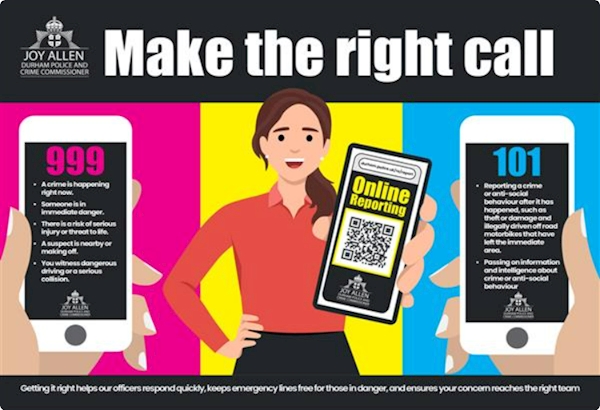|
Yvette Cooper the Home Secretary visited Durham last week to meet with myself and the Chief Constable to discuss the roll out of the much-anticipated Neighbourhood Policing Guarantee. This initiative will ensure that every community in our Force area will benefit from dedicated and accessible neighbourhood officers, visible patrols, and easier ways to raise concerns.
At the heart of the guarantee is a simple but important message: your police service is here for you. But still far too many people are unsure of the best way to report crime and anti-social behaviour.
Should you dial 999, call 101, report online, or go to Crimestoppers?
Getting it right helps our officers respond quickly, keeps emergency lines free for those in danger, and ensures your concern reaches the right team.
When to Call 999
The 999 number is for emergencies only. You should dial 999 straight away if:
• A crime is happening right now.
• Someone is in immediate danger.
• There is a risk of serious injury or threat to life.
• A suspect is nearby or making off.
• You witness dangerous driving or a serious collision.
Using 999 correctly allows the police to prioritise incidents where every second counts.
When to Call 101
For all non-emergency situations, 101 is the right number. This includes:
• Reporting a crime or anti-social behaviour after it has happened, such as theft or damage and illegally driven off road motorbikes that have left the immediate area.
• Passing on information and intelligence about crime or anti-social behaviour
By using 101 for less serious matters, you help keep the emergency lines free.
Online and Webchat Reporting
As your Police and Crime Commissioner I have invested a significant amount of money to improve the Force’s response to 101 and 999 calls. So, you now have a range of options to report crime and anti-social behaviour via the Durham Constabulary website.
The new online reporting tool allows you to log details of incidents at a time convenient to you, without waiting on the phone.
For those who prefer real-time support, webchat services connect you directly with police staff via your computer or smartphone.
This can be especially helpful for people who may struggle with phone calls or who want a written record of advice.
Crimestoppers – Stay 100% Anonymous
Not everyone feels comfortable speaking directly to the police. If you have information about crime but want to remain anonymous, you can call Crimestoppers on 0800 555 111 or report online at crimestoppers-uk.org.
They will never ask for your name, and calls cannot be traced. Every year, vital information passed 100% anonymously through Crimestoppers and this valuable information helps our police take dangerous people off our streets.
Local Engagement – PACT Meetings and Police.uk
You can find out when your next Police and Communities Together (PACT) meeting is being held, and who your dedicated neighbourhood officers are, by visiting www.police.uk.
PACT meetings are a chance to raise local concerns face-to-face – whether it’s anti-social behaviour, speeding, or community safety issues.
Building Safer Communities Together
Knowing when and how to contact the police is part of that. Whether it’s a life-or-death emergency, a concern about nuisance behaviour, or a suspicion you’d rather share anonymously, there is always a route to report it.
By using the right channel, you help the police respond more effectively, keep our communities safe, and ensure resources go where they are needed most.
Together, let’s make County Durham and Darlington safer, stronger, and more resilient to crime and anti-social behaviour.

| 





